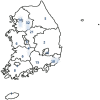Management of Acute Gastroenteritis in Children: A Survey among Members of the Korean Society of Pediatric Gastroenterology, Hepatology, and Nutrition
- PMID: 31555567
- PMCID: PMC6751101
- DOI: 10.5223/pghn.2019.22.5.431
Management of Acute Gastroenteritis in Children: A Survey among Members of the Korean Society of Pediatric Gastroenterology, Hepatology, and Nutrition
Abstract
Purpose: No national survey has yet described the guidelines followed by Korean pediatricians to treat acute gastroenteritis (AGE). An online survey was performed to investigate the management of AGE followed by members of The Korean Society of Pediatric Gastroenterology, Hepatology, and Nutrition, and the results were compared between pediatric gastroenterologists (PG) and general pediatricians (GP).
Methods: Questionnaires were sent to pediatricians between June 2 and 4, 2018 regarding the type of hospital, indications for admission, antiemetic and antidiarrheal drugs and antibiotics prescribed, and dietary changes advised.
Results: Among the 400 pediatricians approached, 141 pediatricians (35.3%) responded to the survey. PG comprised 39% of the respondents and 72.7% worked at a tertiary hospital. Both PG and GP considered diarrhea or vomiting to be the primary symptom. The most common indication for hospitalization was severe dehydration (98.8%). Most pediatricians managed dehydration with intravenous fluid infusions (PG 98.2%, GP 92.9%). Antiemetics were prescribed by 87.3% of PG and 96.6% of GP. Probiotics to manage diarrhea were prescribed by 89.1% of PG and 100.0% of GP. Antibiotics were used in children with blood in diarrheal stool or high fever. Dietary changes were more commonly recommended by GP (59.3%) than by PG (27.3%) (p<0.05). Tests to identify etiological agents were performed primarily in hospitalized children.
Conclusion: This survey assessing the management of pediatric AGE showed that the indications for admission and rehydration were similar between GP and PG. Drug prescriptions for diarrhea and dietary changes were slightly commonly recommended by GP than by PG.
Keywords: Child; Disease management; Gastroenteritis; Pediatricians; Surveys and questionnaires.
Conflict of interest statement
Conflict of Interest: The authors have no financial conflicts of interest.
Figures
References
-
- Guarino A, Ashkenazi S, Gendrel D, Lo Vecchio A, Shamir R, Szajewska H. European Society for Pediatric Gastroenterology, Hepatology, and Nutrition/European Society for Pediatric Infectious Diseases evidence-based guidelines for the management of acute gastroenteritis in children in Europe: update 2014. J Pediatr Gastroenterol Nutr. 2014;59:132–152. - PubMed
-
- World Health Organization. The treatment of diarrhoea: a manual for physicians and other senior health workers. 4th rev. Geneva: World Health Organization; 2005.
-
- Tieder JS, Robertson A, Garrison MM. Pediatric hospital adherence to the standard of care for acute gastroenteritis. Pediatrics. 2009;124:e1081–e1087. - PubMed
-
- Lo Vecchio A, Liguoro I, Bruzzese D, Scotto R, Parola L, Gargantini G, et al. Accreditation and Quality Improvement Working Group of Italian Society of Pediatrics. Adherence to guidelines for management of children hospitalized for acute diarrhea. Pediatr Infect Dis J. 2014;33:1103–1108. - PubMed
-
- Spandorfer PR, Alessandrini EA, Joffe MD, Localio R, Shaw KN. Oral versus intravenous rehydration of moderately dehydrated children: a randomized, controlled trial. Pediatrics. 2005;115:295–301. - PubMed


